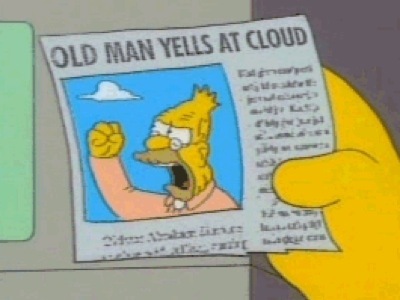Schrödinger’s Home
“No one of intelligence resents the inevitable. It had been the Golden Age. But gold was also the color of sunset, of autumn.”
Clarke, Childhood’s End
by Terra_Cide, HSM Editor-in-Chief
So now then.
The obvious question on a lot of minds right now is the future of PlayStation Home for SCEA and SCEE. Although I enjoyed that richly-deserved moment of schadenfreude written about earlier, that has to do with a handful of self-important Japan worshipers, not with the ultimate fate of those regions themselves. It is a sad — albeit inevitable — day to see a Home region (let alone two of them) effectively condemned to a slow death.
And so the speculation begins: will the same thing happen to Home in North America and Europe, despite their far greater audience sizes and economies?
The question is not whether any of us know (even if we did, we wouldn’t be allowed to share it) — the question is whether or not Sony itself knows. Because there are ultimately only two possible outcomes: either SCE has decided to sustain Home on the PS3 for as long as it’s profitable (and possibly explore porting to other platforms if fiscally justifiable), or SCE has already decided to end it at some predetermined point in time.
The one thing we want to start with, as a baseline assumption, is that Home will probably never make it to the PS4. Despite Home 1.7’s core update which moved everything into the cloud — thereby allowing it to be streamed to other platforms such as the PS4 via Gaikai — there has been zero mention of Home in any official PS4 press from Sony. Indeed, given that what little we’ve been shown of the PS4’s social sharing features seems to completely bypass the need for an avatar-based UI/UX, Home might almost feel like a step backwards, with its egregiously long loading times, network connectivity problems and byzantine content submission and commerce setup. So while Home on a next-gen console would be nice, it has at best one chance in three of happening.
 Before we continue: please refrain from knee-jerk anti-Sony invective. We’re big boys and girls; we’ve spent varying sums of money on a product and service that’s given us years of entertainment, and it continues to be supported by SCEA and SCEE long after it became clear that it would never live up to its original concept and purpose, nor could it sustain itself after being reimagined as a gaming platform.
Before we continue: please refrain from knee-jerk anti-Sony invective. We’re big boys and girls; we’ve spent varying sums of money on a product and service that’s given us years of entertainment, and it continues to be supported by SCEA and SCEE long after it became clear that it would never live up to its original concept and purpose, nor could it sustain itself after being reimagined as a gaming platform.
Our best guess is that Home has around a million active users (the bulk of whom clustered in the two remaining active regions still accepting new content), and if the user base monetizes along fairly conventional statistical lines for a freemium MMO, that means that at best about 100,000 users monetize on a semi-regular basis, with only about 30,000 monetizing consistently and around 10,000 who would be considered whales. Considering that Sony is almost certainly deriving the bulk of its profit from thirty-percent cuts as the platform provider — rather than being the main content provider as it was in the early days — it becomes obvious that they have taken every measure possible to fiscally justify keeping Home as a vertical alive on the balance sheet.
Elements of the community have gotten very adept at criticizing Sony for not being more overtly supportive of Home; they fail to realize, even now with the latest business decisions behind SCEJ/SCEAsia Home, that perhaps keeping America and Europe going, considering the resources Home chews up (manpower which could be put to use on other, newer projects), is a charitable blessing, which can only be justified by cutting costs down as low as possible to make the net profit margin stronger. It’s not a formula for long-term success, but it is a way to keep the lights on when your parent company is haemorrhaging money and constantly scrutinizing the books for any means of cost containment.
 Realize that Home was conceptually born at a time when YouTube didn’t exist, Zynga was still years away, and no one had heard of Facebook. Back in those days, the concept of Home for a console — first, the PS2, then the PS3 — was cutting-edge and innovative. Everyone had a sense that social gaming was the new upcoming trend, but no one knew what the best formula was to harness it. Then throw in that the conceptual founder for Home went to work for the competition, leaving new personnel (with, at best, limited understanding of behavioral economics and the social dynamics behind sustaining a successful social MMO) to inherit someone else’s vision, and you end up with more or less where we’re at now.
Realize that Home was conceptually born at a time when YouTube didn’t exist, Zynga was still years away, and no one had heard of Facebook. Back in those days, the concept of Home for a console — first, the PS2, then the PS3 — was cutting-edge and innovative. Everyone had a sense that social gaming was the new upcoming trend, but no one knew what the best formula was to harness it. Then throw in that the conceptual founder for Home went to work for the competition, leaving new personnel (with, at best, limited understanding of behavioral economics and the social dynamics behind sustaining a successful social MMO) to inherit someone else’s vision, and you end up with more or less where we’re at now.
(Or, the TL;DR version of the last three paragraphs for the forum users: Home was a concept that was never fully realized, hampered by business strategies which failed to grow the user base to a desired level, and we should be damned grateful that they’ve decided to keep the lights turned on for us. So own up to the time and money you’ve spent and stop blaming Sony for all the good times you chose to have over the years, even knowing what the score was.)
So. Back to the key question here: does Sony know what to do with Home at this point, or have they not yet made up their minds? Let’s examine both possibilities.
Possibility #1:) Sony doesn’t yet know what to do with Home.
This is the more optimistic scenario.
I know that sounds strange, but think about it: there’s no grand plan or vision for Home. The closest thing to a grand plan was the attempt to turn it into a social gaming platform in an attempt to broaden the user base, and it’s clear that that plan failed. SCE is a business with a lot of verticals, including any number of projects that are far larger in scope and potential revenue than anything Home could ever be, and it’s under tremendous financial scrutiny. In such an environment, do you really expect significant long-term planning and substantial resource allocation?
The closest to this — and if true it is perhaps the best ray of hope we’ve heard of — is the rumor that there is a “roadmap” document for Home development on Sony’s DevNet. We have heard rumblings of some remarkable upcoming core features for Home, which if true suggests that there is at the very least planned support for Home for the next year. Possibly longer. Which, in the current climate, is really all we can ask for as consumers. I think most of us are at the point where we’ve shelved the dream of what Home could be, and would just be happy with Home as it is to be kept alive.
Possibility #2:) Sony has already decided Home’s fate.
This is, perhaps, the more likely scenario.
 There’s just no getting around the fact that newer MMO experiences such as Final Fantasy XIV and Grand Theft Auto Online are delivering (and going to deliver) some remarkable experiences that are far beyond anything Home is capable of, even if it had the budget to match. Home’s greatest strength was that it was arguably the most graphically superior console-based MMO available, and that’s gone out the window. Coupled with its inherent weakness as a social metaverse with no clearly defined purpose, and it’s clear that Home is in an evolutionary cul-de-sac.
There’s just no getting around the fact that newer MMO experiences such as Final Fantasy XIV and Grand Theft Auto Online are delivering (and going to deliver) some remarkable experiences that are far beyond anything Home is capable of, even if it had the budget to match. Home’s greatest strength was that it was arguably the most graphically superior console-based MMO available, and that’s gone out the window. Coupled with its inherent weakness as a social metaverse with no clearly defined purpose, and it’s clear that Home is in an evolutionary cul-de-sac.
This doesn’t mean Home is dead, necessarily. It just means that it’s transitioning from a growth phase to a maturation phase. It does, however, portend a slow death. And that shouldn’t be much of a surprise; everything comes to an end at some point. It’s just a question of how long.
In such a scenario, Sony’s strategy of “don’t go away mad, just go away” makes a lot of sense:
- Triage losses by closing the doors on new content submissions for underperforming regions.
- SCEJ/SCEAsia user numbers dwindle due to lack of fresh content infusion. Users migrate to other experiences on the PS3/PS4/Vita.
- Diminished revenue and user numbers leads to shutdown of these regions.
- Radio silence on long-term guidance for SCEA/SCEE Home regions causes third-party developers to shift resources to other ventures and users to reduce monetization; the two go hand in hand.
- Reduced revenue eventually forces Sony to stop accepting content submissions, however that announcement comes well after the PS4 is out and consumer attention is focused on the new platform and new attractions. Negative press reaction is minimal.
- Lack of content infusion signals the final, florid phase of PlayStation Home: it is a wild time for those few hardcore users who remain.
- Final shutdown date is announced; Sony scuttles the economy by making all first-party content free. It is a remarkable, bittersweet time for those few die-hards who stay until the end.
- PlayStation Home is discontinued. Despite vocal protests from a handful of users, most of Home’s former citizenry migrates to other PlayStation verticals.
Keep in mind: the sequence above is purely speculative. It is, however, what we believe to be the most plausible scenario. Keep the doors open for as long as it’s fiscally justifiable, then shutter them as soon as users take the hint and start migrating elsewhere in sufficient numbers that the revenue no longer sustains the overhead. In this fashion, Home dies a “natural” death, rather than being euthanized (which, if it were done now, would be tacit admission from SCEA that the implied fiscal health of Home as a platform was nothing more than exaggerated sales talk), thus minimizing negative reaction.
The big question, of course, is when.
Ultimately, assuming Sony hasn’t already set an end date, that’s the one part of this equation which is up to us as consumers. We have read with dismay comments from some users on the Sony forum calling for boycotts, protests, et cetera; this is exactly the wrong thing to do. You’ve had a great time with Home, you’ve been more than compensated for the money you voluntarily chose to spend, and it is ultimately your choice to remain. Your wallet is the fuel that allows Sony to point to the spreadsheet and justify Home’s existence. If you truly wish to support Home, as we do, then the correct answer is to spend.
Understand this, though: there will come a point for us in North America and Europe when we will be faced with the same choice our brothers and sisters in Japan and Asia now face: whether to continue pumping money into an experience that the platform provider has itself largely abandoned and only keeps on life support, with no hope of future growth. Whether that moment comes a year from now or a decade from now, it will happen.
This is not meant to depress anyone. It’s a wake-up call to take fiscal responsibility. PlayStation Home was — and is — a fantastic ride, and though we believe the finish line is now in sight, it’s a ride that continues to be worth the price of admission for those who enjoy it responsibly. Although we have already issued guidance in previous articles to Home’s third-party developers to explore non-Home revenue sources — seriously, if any developer is still completely Home-centric in twelve months, you’re really playing Russian Roulette with five slugs chambered — it is our hope that the content pipeline will continue, along with the rumored upcoming core updates offering new functionality, to provide sufficient enticement for Home users to happily monetize for quite some time to come.
Humans, of course, tend to act on emotional impulse rather than rational thought. One need only watch a panic sell-off on Wall Street to see human nature in action. So we’re going to throw our hat into the ring with a guess as to when Home will finally, irrevocably end:
Sony operates on fiscal years which end on March 31. We believe the soonest date for SCEA/SCEE shutdown is March 2015, allowing Sony to start their 2015 fiscal year in April without Home on the balance sheet. Assuming Sony follows the same pattern they did with SCEJ/SCEAsia Home, that places a new content cessation announcement at roughly twelve months from now.
Anything beyond that date, as far as we’re concerned, is gravy. If we’re lucky, lots of gravy.
 Again: we could be totally wrong. Sony might have a grand plan for Home that takes it to the PS4. They might have a grand plan for Home that doesn’t take it to the PS4, but keeps it on the PS3 for years, albeit perhaps without new content coming in after a certain point. Or perhaps they have no plan for Home at all, and are studying us to see how we react — with our wallets, not our emotions — to the news about Japan and Asia.
Again: we could be totally wrong. Sony might have a grand plan for Home that takes it to the PS4. They might have a grand plan for Home that doesn’t take it to the PS4, but keeps it on the PS3 for years, albeit perhaps without new content coming in after a certain point. Or perhaps they have no plan for Home at all, and are studying us to see how we react — with our wallets, not our emotions — to the news about Japan and Asia.
The best guidance we can offer to you, the reader, is this: if you enjoy Home, keep spending and enjoying it to the fullest. No, you can’t take any of it with you. But the same is true of life. Enjoy things while you can. And when the final days of Home are finally upon us, we suspect it will be a remarkable time, filled with tremendous works of art, machinima, writing and more. As a publication which studies gaming and Home predominantly from a sociological perspective, we look forward to covering it for you–
–when it happens.
But that’s tomorrow. Right now, there’s still a whole lot of today left to enjoy.
Share
| Tweet |





 Twitter
Twitter
Very well said Terra. I hope that people will take this to heart and continue to buy things from the devs. It would be a shame if they decided to go the other route and basically cut Homes throat and their own in the bargain. I for one will continue to support Home as long as I can with both my voice and my wallet.
If it comes to a self fulfilling prophecy then as a business the information they have or haven’t released is the cause. Whatever people say 50 / 50 purchases users might of bought are now more likely to not be bought. I think the things we would of bought will still be bought but there is no where I’m spending 50 dollars on a casino bundle when the only real info we have is developers are planning to support NA and EU past March 2014. The doom mongers are out saying I’ve told you so and the over optimistic users are out clinging to whatever rumors give them hope. Whatever the outcome is I don’t think the community could be asked anymore of, Home has loads of support from its users giving up they time and own money to push the community forward. But that may not be enough and how anyone can ask users to spend big when no real information is forth coming from the thing we are trying to save is just plain wrong. Ultimately just enjoy it while it lasts. If it stays great, if it goes then I’m sure we will look back with fond memories.
“Whit’s fir ye’ll no go by ye”
In other words (with Home) each of us shall get what we want out of it regardless of how little (or much) effort and time we put in. I love Home, it’s an escape, a vent, a window into human perceptions and reactions; it’s just about the best place for seeing our true colours in a fluid, real-time way using the internet. It’s possibly also the most adventurous anthropological study ever, ever ever! The things I’ve seen in there already match or go beyond the asking price of what I’ve sunk into it, and for that, I’m happy.
Personally, I don’t think Home’s going anywhere any time soon, my guess is it has at least another 4 or 5 years left. There’s a few out there that have a PS3 specifically for Home, sounds nuts I know, but it’s true. I don’t see how Sony couldn’t market Home as a selling point for the PS3 without any other attachments. But then I’m also aware of how weak Sony is at advertising, and know the costs of which would probably never match outgoings in that scenario. But still, my point is that Home *could* well be the thing that keeps the PS3 alive at the end of its life-cycle.
As a fluid, social platform that does only that, the potential that’s STILL in Home is massive. Yet as you’ve already pointed out Terra; without its visionary at the helm, it’s just going to continue to drift on the tides of money until they dry up. Kinda sad really, like watching a talented friend hoar themselves out because they’re too lazy to THINK.
Fantastic read though Terra.